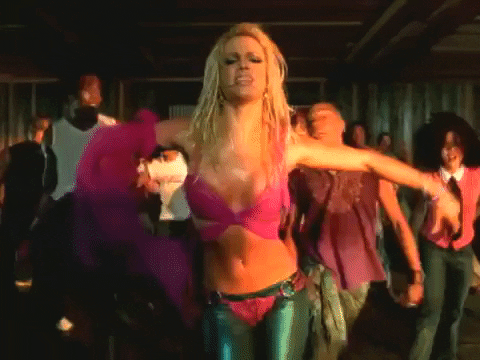Last week, we launched the Fuck Off Russell Guide To New Year’s Experiments. And you might remember us mentioning this stat:
80% of us will have failed to keep our New Year’s resolutions by February.
Were you surprised? Yep, us neither.
Most of us have probably written a list of overly-enthusiastic New Year’s resolutions at some point in our lives. And then felt a mix of guilt, frustration and disappointment when we didn’t manage to live up to our ‘new year, new me’ hype.
If that’s you, the first thing you should know is that you’re not alone—that 80% stat can make you feel a bit better, for a start. And as
points out, even Leonardo DiCaprio is bad at New Year’s resolutions.The second thing you should know is that there’s a psychological explanation as to why resolutions set us up to fail.
We touched on this in our last post, but today we’re going to dive into it some more.
POV: you’re making a New Year’s resolution
To understand why we fail, we need to rewind to when we made the resolution.
Picture this. You’re nursing a Baileys-induced hangover. You’re scrolling through Instagram. You see a load of wellness influencers bouncing around their home fitness studios and chugging green smoothies. Your cousin (the family golden child) posts about the seven triathlons they ran last year. An ad pops up promising to change your life with a Britney-themed boxing and ballet fusion class.
You stare in disbelief at the model’s abs. Think guiltily about all the pigs in blankets you ate over Christmas. And wonder if, in fact, low rise jeans are making a comeback.
And then it begins. This year will be your year. You will wake up at 5am every day like the girl from Tik Tok. Make your own green smoothies from scratch. Start a gym membership and sign up for those Britney-boxing-ballet classes. This time next year, you will be ~unrecognisable~.
But wait…
Do you really want to wear low rise jeans?
The answer is no. They will never be comfortable.
But in all seriousness, this is the first step in understanding why resolutions fail. Because if we unpack the example above, we start to see that it’s coming from a place that’s heavily influenced by—you guessed it—our inner critic.
The resolution to change is motivated by feelings of guilt, pressure and comparison (thanks, social media). According to psychology, this is the nail in the coffin for achieving our goals.
Here’s an excerpt from our guide, where Molly explains why this is.
Fuck Off Russell’s Guide to New Year’s Experiments - Chapter 1, The Science
We live in a society where the quick fix is heralded above perpetual process. We're in the Instagram age of instant gratification, of overnight success, of life hacks, short cuts and quick fixes. When we're approaching the end of the year, the idea that simply by writing down something we'd like to change about ourselves on a piece of paper, is sexy, seductive and easy.
The problem we face is that, even with our resolution in hand and the best of intentions to keep it, ultimately we are still the same person, with the same habitual patterns that got in the way of us doing whatever it was we want to change in the first place.
Gestalt Psychotherapy describes the Paradoxical Theory of Change, which says that by actively trying to change something about ourselves, it will become more entrenched. It is only when we start to accept how we are, that paradoxically we might start to change.
"Gestalt Psychotherapy believes that change does not take place by "trying," coercion, or persuasion, or by insight, interpretation, or any other such means. Rather, change can occur when the [person] abandons, at least for the moment, what they would like to become and attempts to be what they are. The premise is that one must stand in one place in order to have firm footing to move and that it is difficult or impossible to move without that footing."
TLDR: Change does not take place by trying, but by accepting
Let’s revisit that resolution. If we reframe it using the Paradoxical Theory of Change, we would approach it from a place of appreciation for our body. In other words, if the underlying intention is wanting to care for ourselves and feel healthier, we’re more likely to achieve our goal.
Of course, telling Russell (that’s what we call our inner critic) to fuck off isn’t always easy. So to help you get there, we’ve put together a 5-part guide that will show you how to explore your inner critic and build up that self acceptance. Meaning you can set resolutions that truly serve you and are built to last.
You can download the guide from our website for £8.99.
How do you feel about New Year’s resolutions? We’d love to hear your thoughts in the comments.
We’re here every week with tips and insights on expanding your self-awareness. Don’t forget to subscribe if you haven’t already.





